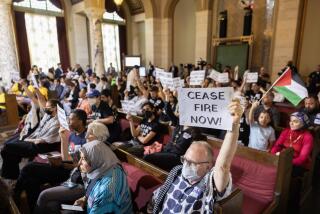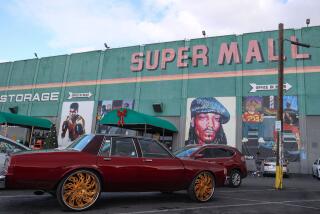Merchants Find Political Quest for Riot Relief Frustrating : Unrest: Korean-Americans whose businesses were damaged in the riots take their protest daily to City Hall. They are being ignored by passersby and politicians.
- Share via
Every weekday, Jeong K. Cho travels from his rented Mid-Wilshire area home to downtown Los Angeles and takes his place in line among hundreds of other Korean-Americans, slowly treading a circle around City Hall.
Wearing chartreuse caps--donated by a Korean tire dealer--to shield them from the sun, they carry placards with slogans such as “Look Who’s Crying” or “Bush Lip Service.” Their cries for “reparations” are almost drowned out by the ear-splitting beats from Korean drums.
Until two months ago, Cho’s days were spent driving his van to deliver watches, miniature radios and small appliances to stores throughout South Los Angeles. But his business was destroyed during the riots when looters plundered the van, stealing or demolishing $20,000 worth of inventory and beating him when he tried to intervene.
Now he spends hours each day with up to 300 other Korean-American merchants who like him have emerged for the first time from their insular, tight-knit community. They march to register anger over their losses and press demands for recompense--in the form of government reparations.
But after 11 days on the line, chanting, marching and holding sit-ins on the City Hall steps, the merchants have found their first attempt at American political protest frustrating. “Nobody pays any attention to us,” Cho complained.
Most of the time they are ignored by passersby as well as politicians.
“We are very disappointed,” said Jin Lee, a leader of the Korean American Victims of L.A. Riot, the fledgling group that organized the protest. “We are standing there four and five hours on very hot days, while the officials inside are in a cool room. But they don’t come out.”
They have written letters, circulated a petition and held press conferences. And although leaders acknowledge some city officials have started to respond, they still say they feel ignored by Mayor Tom Bradley.
More than 3,000 Korean-American business owners suffered losses during the riot. Many were uninsured or underinsured and have had difficulty securing government loans and other aid.
Cho said he has heard of two suicide attempts among merchants since the riots. Young-Soon Han, who lost her liquor and grocery market in the riots, said many marchers complain that they cannot afford to buy food and are hungry.
“We feel betrayed by the public,” she said, as people walked by with barely a glance at the marchers.
To help their recovery, the victims say they are seeking faster processing of government disaster relief loans, the waiving of city fees for permits and taxes, and a hearing to air their grievances.
They want an apology from Bradley, who they say instigated the riots with his strong denunciation of the verdicts in the Rodney G. King beating case. They say the city should pay reparations to make up for their financial losses.
“We are truly innocent victims. We did not cause the riot,” the group said in a letter delivered Monday to Bradley. “Why do we have to suffer the most? . . . .You have never regretted nor admitted your own mistakes.”
The call is similar to a movement in Korea to win compensation from Japan for injustices during World War II.
And behind their feelings of being persecuted in the riots, and ignored in their plight afterward, there is the Korean expression of han.
“Han means a feeling of frustration and let-down when things happen beyond your control,” said Eui-Young Yu, a Cal State Los Angeles sociology professor and an expert on Korean culture.
The word has no direct English counterpart, but reflects the suffering caused by tragedies like the Japanese occupation of Korea, or the division of the country into North and South Korea, Yu said. “The merchants who lost everything and now have to pay for it, that creates another kind of han ,” he said.
Aides to Bradley and Councilman Nate Holden--who represents much of Koreatown--say they have tried to help the merchants and are mystified by their criticism.
“The mayor has met with a number of groups from the Korean-American community, and asked his liaison to meet with them,” Bradley spokesman Bill Chandler said Monday. “Our office is encouraging them to apply for all forms of loans and assistance that are available. However, the mayor has not been willing to entertain any talk of reparations.”
In their quest to be heard, the Korean--American merchants have demonstrated their inexperience in influencing those in power.
“We’re pretty new about this kind of thing,” Lee said. “We’re starting to learn the system.”
During one protest, they sought to exercise their right to “free speech” and address the City Council. Instead, the merchants ended up waiting more than an hour while council members debated other matters on their agenda. Finally they got 10 minutes, after Councilman Mike Woo persuaded his colleagues to interrupt their discussion.
Protest leaders Lee and Joseph Kung--who represents Chinese, Cambodian and other East Asian groups--dramatically displayed a letter, with pages trailing onto the council floor, signed by hundreds of merchants.
This was the 10th letter they had sent, Lee said, but neither the mayor nor any council member had replied. “Mr. President, how come you never sent an answer?” Jin Lee asked that day, addressing Council President John Ferraro.
But Ferraro said he could not answer, citing procedures that limit responses to public comment.
“You guys are elected officers; you got to listen to us,” Lee continued. “We don’t believe racial tension caused the riots. All the mistakes you been doing as City Council members was the main cause of the L. A. riot. We think city is responsible.”
At times, they seem confused about what various city officials do. When City Atty. James Hahn visited the Westlake Avenue offices of the Korean-American victims group, Lee and others complained about the police performance during the riots.
But Hahn said he could not comment. “We are the lawyers for the Police Department,” he explained.
When the group complained about a new ordinance to restrict the reopening of liquor stores in South Los Angeles and asked if it could be legally challenged, the city attorney noted his staff had written the new law and warned: “My job would be to defend the ordinance.”
In a two-hour session, Hahn seemed to assume the role of civics teacher with the group.
Lee expressed bewilderment that “No leader has come out and said, ‘This is my responsibility.’ ” In Korea, he said, “Morals is very important.” He wondered why none of the city’s top officials resigned after the riots.
“There are different traditions here,” Hahn said. “People do not resign if there is a failure, as a matter of course.”
On Monday, Lee said he was pleased with recent developments, which included meetings with Small Business Administration officials who have pledged to cut red tape in processing loans.
“We’re finally getting answers,” he said.
More to Read
Sign up for Essential California
The most important California stories and recommendations in your inbox every morning.
You may occasionally receive promotional content from the Los Angeles Times.










